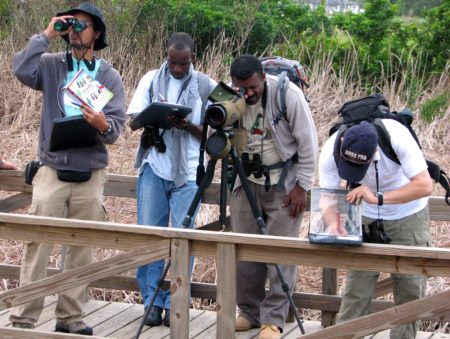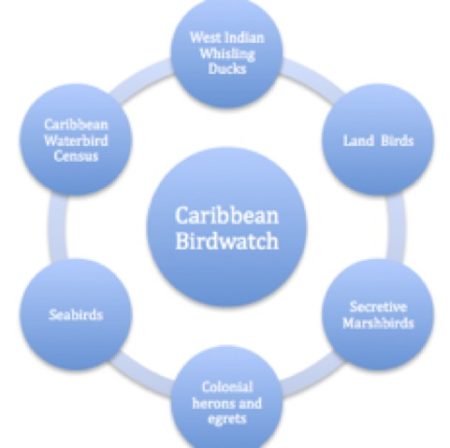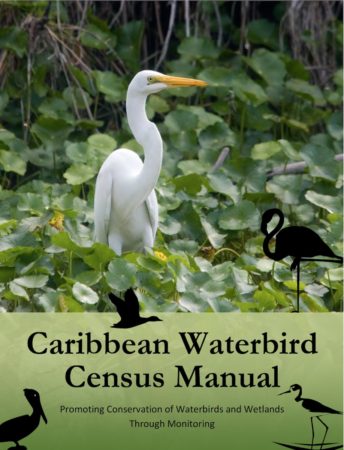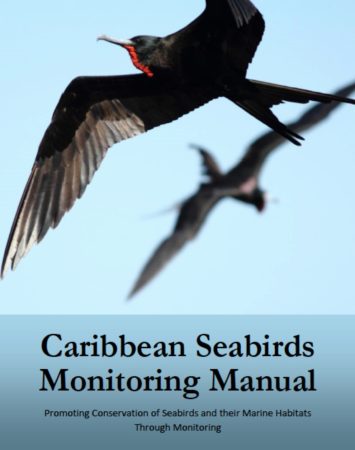Bird Monitoring Working Group

The long-term vision of BirdsCaribbean’s Bird Monitoring Working Group is to enable Caribbean countries to build high-quality bird monitoring and training programs that have regional relevance and significance because of shared species and habitats. Within this context, the Working Group will:
- Foster inter-island cooperation and collaboration in the regional monitoring of shared species of birds (including neotropical migrants) and their associated habitats;
- Work to significantly increase the number of skilled field biologists living in the region;
- Build regional capacity to carry out standardized monitoring and training programs, including bird banding.
Although the focus of the working group is on the Caribbean islands, the group will cooperate with other groups, agencies, and interests working on common goals within the Caribbean, Latin America, and the Western Hemisphere. The Monitoring Working Group meets and holds workshops at BirdsCaribbean’s International Conferences. The Group also develops training manuals and raises funds for monitoring training workshops and related partner activities.
Objectives of the Bird Monitoring Working Group
- Compile and disseminate information on existing monitoring and training programs that are relevant to the Caribbean;
- Identify and promote standardized monitoring protocols that can be used to report upon status and trends of species of interest within the Caribbean;
- Promote the need for the creation of a common database structure and data-sharing system, so that data of regional interest can be archived, retrieved, and analysed by program participants – this includes eBird Caribbean, as well as other data programs;
- Support the development of an internet program to facilitate regional data input from scientists and volunteers (birdwatchers, students, etc.), to compile data, and retrieve reports, maps, etc. – this includes eBird Caribbean and additional programs as needed;
- Promote standardized protocols for training specialized field staff, with a view towards creating a cadre of trainers in the Caribbean;
- Support the development of banding programs and banding stations in the Caribbean;
- Attempt to identify one or more regional “centers of excellence” in the Caribbean that can take a lead role on developing monitoring, banding, and training programs within the region; and
- Seek resources to undertake the above.
History of the Monitoring Working Group’s Activities

With initial funding from the Organization of American States (OAS) and USFWS’ Western Hemisphere Migratory Species Initiative (WHMSI), BirdsCaribbean held a series of training workshops on bird monitoring. The first was an All-Bird Monitoring Workshop in Nassau, Bahamas, at the Bahamas National Trust headquarters, The Retreat, in 2009. This is where the Caribbean BirdWatch Monitoring Program, a comprehensive monitoring initiative for the Caribbean, was conceived.
Products included a basic introduction to monitoring in a manual “Caribbean Birdwatch – How to Design and Implement Bird Monitoring in the Caribbean”, which includes information about designing a monitoring program, training, selecting equipment, assessing habitats and analyzing data, as well as a broad range of protocols. The core manual is supplemented by more detailed manuals, trainings and support activities for specific groups of birds (Figure 1).
 The Monitoring WG decided to first focus on developing standardized methods and training for monitoring of Caribbean waterbirds and shorebirds. The Caribbean Waterbird Census (CWC) Program was developed and a CWC Monitoring Manual was written.The CWC Program promotes 1) a regional count during a 3-week period in the winter (Jan 14 to 3 Feb), when birds are stationary on the landscape, and 2) as many counts as possible during fall and spring migration and other times of the year to learn more about habitat use and important sites for migratory and resident waterbirds.
The Monitoring WG decided to first focus on developing standardized methods and training for monitoring of Caribbean waterbirds and shorebirds. The Caribbean Waterbird Census (CWC) Program was developed and a CWC Monitoring Manual was written.The CWC Program promotes 1) a regional count during a 3-week period in the winter (Jan 14 to 3 Feb), when birds are stationary on the landscape, and 2) as many counts as possible during fall and spring migration and other times of the year to learn more about habitat use and important sites for migratory and resident waterbirds.
With funding and support from the USFWS and many partners, BirdsCaribbean has held a series of International Workshops on the CWC Program, the most recent in Cabo Rojo, Puerto Rico, in 2019. The workshops provide training, equipment, and small grants for wildlife professionals from all over the Caribbean to implement their own waterbird monitoring programs and wetland conservation actions. Thanks to the many contributions of our partners, the CWC, now in its 11th year, is yielding invaluable data on key sites for conservation and numbers and trends of waterbird and shorebird species of conservation concern (see results here, here, and here). A comprehensive 10 Year Report on the CWC is in preparation.
 The Monitoring Group next focussed on Caribbean seabirds. With support from the National Fish and Wildlife Foundation, a Seabird Monitoring Manual was created, several international training workshops were held, and small grants awarded to partners to implement seabird monitoring and restoration projects. The Seabird Manual was translated to Spanish and French. The Seabird Working Group is active. Partners throughout the region have undertaken projects to train locals to monitor and protect seabird colonies, and there are exciting new research projects tracking the movements of Magnificent Frigatebirds and other seabirds. Partners are also carrying out invasive species eradications on islands with nesting seabirds with much success. Read more here.
The Monitoring Group next focussed on Caribbean seabirds. With support from the National Fish and Wildlife Foundation, a Seabird Monitoring Manual was created, several international training workshops were held, and small grants awarded to partners to implement seabird monitoring and restoration projects. The Seabird Manual was translated to Spanish and French. The Seabird Working Group is active. Partners throughout the region have undertaken projects to train locals to monitor and protect seabird colonies, and there are exciting new research projects tracking the movements of Magnificent Frigatebirds and other seabirds. Partners are also carrying out invasive species eradications on islands with nesting seabirds with much success. Read more here.
The Monitoring WG is now focusing on land bird monitoring and bird banding as a tool to better understand habitat use, numbers, and trends of resident, endemic and migratory birds in the Caribbean.
